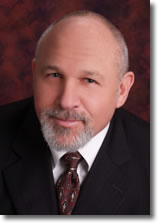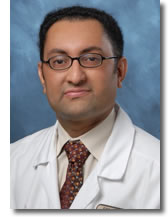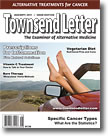|
 Over the past seven years, Steven M. Helschien, DC, has been exploring ways to prevent and treat heart disease. His innovative program, Cardio Crusaders, could potentially offer all of us new methods to evaluate our cardiac health and improve our chances for a long, healthy life. Over the past seven years, Steven M. Helschien, DC, has been exploring ways to prevent and treat heart disease. His innovative program, Cardio Crusaders, could potentially offer all of us new methods to evaluate our cardiac health and improve our chances for a long, healthy life.
"The idea for Cardio Crusaders was born when my mother got congestive heart failure," Helschien recalls. "During her illness, I realized how many problems there are with traditional cardiology. They didn't have a testing program to evaluate people for presymptomatic changes. They offered drugs and surgery, but didn't have an evidence-based program of supplements and other preventive actions to offer their patients."
At that time, Helschien had recently sold his chiropractic clinics and retired from practice. "I watched my mother go through conventional treatment, and it really was a sad state of affairs. As a chiropractor, I had experience in nutrition, exercise, and treating the whole person, not just the disease. During my mother's illness, none of that was happening – I mean none of it! My mom was perceived as just an example of congestive heart failure." In response, he started to think about ways to fill those gaps, and offer people more comprehensive, holistic cardiac care.
Conventional cardiology tends to focus on the heart, which pumps blood, and the heart valves, which open and close to channel the flow of blood. However, most cardiovascular disease is actually due to problems in the blood vessels (arteries, capillaries, and veins) ... what Helschien refers to as "problems in the plumbing." Heart attacks are generally due to soft plaque, the fatty lining of the blood vessels, which can unexpectedly rupture and stop the flow of blood to the heart.
The conventional test for arterial health is an angiogram, in which physicians take pictures of a special dye running through the arteries of the heart. This is an invasive test. You have to run a tube from the groin or the arm to carry dye to the heart. The test itself can lead to a heart attack or other complications. Because of the risk and expense, angiograms are only used for people who already have signs of serious heart disease.
Now Helschien and his team have put together an array of noninvasive tests that offer clues to the current functioning of our "cardiovascular plumbing." These tests can be used for people who don't have any symptoms of heart disease ... but may be at significant risk for a heart attack. The tests may be performed by Cardio Crusaders technicians, or by practice staff who obtain special training. "We started rolling out the program about six months ago," Helschien says. "We're in a number of offices, mostly in Florida, Arizona, and New York. We've experienced a very positive response from primary care and family practice physicians, especially osteopaths. Cardiologists have expressed interest because it is a valuable addition to what they're currently doing."
Noninvasive Tests Offer Valuable Information
The Cardio Crusaders program starts out with a panel of noninvasive tests for early detection of cardiovascular disease. These tests can be completed in about 45 minutes in the doctor's office, and the cost is often covered by insurance. They include:
- EndoPAT
- pulsewave analysis (accelerated plethysmography)
- heart rate variability (HRV)
- Carotid HeartSmart Intima-Media Thickness Test
- abdominal aortic aneurysm test
- Zargis Cardioscan
- pulse oximetry measurement
Pulse wave analysis measures the stiffness of the arteries, a major cardiovascular risk factor. EndoPAT uses a finger clip biosensor to assess functioning of the inner lining of the blood vessels. The intima-media thickness test uses ultrasound imaging to detect disease at the carotid artery. (For more details about each of the tests, see the Cardio Crusaders website.)
 Ram Dandillaya, MD, an attending physician at Cedars-Sinai Medical Center and a member of the staff at Cedars-Sinai Heart Institute, has a special interest in preventive strategies to optimize cardiovascular health, including advanced imaging and lipid testing. He already uses some of these tests in his clinical practice, and plans to incorporate the full Cardio Crusaders program when it rolls out on the west coast. Ram Dandillaya, MD, an attending physician at Cedars-Sinai Medical Center and a member of the staff at Cedars-Sinai Heart Institute, has a special interest in preventive strategies to optimize cardiovascular health, including advanced imaging and lipid testing. He already uses some of these tests in his clinical practice, and plans to incorporate the full Cardio Crusaders program when it rolls out on the west coast.
"I have to tell you, Steve has really been a pioneer in this area," Dandillaya says. "He has researched all of these modalities to a very high level, and he has picked out some of the leading-edge options. I've been very impressed. With the key tests he uses, we can obtain lots of information about people's cardiac risk."
Using the test results, the physician will recommend appropriate lifestyle changes and nutritional supplements for each patient. In a small percentage of cases, the tests discover serious heart disease, and those patients are immediately referred for major treatment such as angioplasty, a stent, or cardiac bypass.
Support for Lifestyle Changes
Lifestyle changes such as improved diet, weight management, and increased exercise are an essential part of preventive cardiovascular care. However, actually making those changes isn't easy for any of us.
One of the most impressive aspects of Cardio Crusaders is its free program of wellness coaching, over the phone. First the physician discusses all the medical data with the patient. Then the wellness coach discusses nutritional supplements, exercise, and weight management. A person who commits to any one lifestyle change qualifies for continued telephone support.
Every few days the person fills out a "staying on track" questionnaire, which asks about daily activities, overall health, personal relationships, and sleep. This questionnaire helps people remember what they want to do, and keep track of what they've actually done. Filling out the questionnaire, and then talking on the phone with a supportive wellness coach, helps people actually change their habits.
Cardio Crusaders Face Challenges
Helschien is an enthusiast, a man with a mission. He believes that over the next three years Cardio Crusaders will change our paradigm for cardiovascular care.
However, the program faces considerable challenges. In our present health-care system, there are significant barriers to the use of new technologies. Our current payment process often emphasizes care for severe disease, while limiting reimbursements for preventive care. "Technical change moves slowly," says Dandillaya. "There will always be some physicians who are early adopters, but cardiologists tend to be conservative."
On the other hand, Dandillaya and other physicians like him are pressing for change. "We are able to demonstrate better outcomes," he says. "Patients are happier, they are making lifestyle changes, and physicians are hearing positive feedback from them. The American College of Cardiology and the American Heart Association, two of the major organizations in cardiology, are starting to recognize the importance of noninvasive testing."
In all probability, over the next three years we'll see a gradual rollout of the Cardio Crusaders program, as it becomes available throughout the country. Physicians with a special interest in healthful lifestyles will be attracted to this program. Patients who value preventive care will actively seek out physicians who offer Cardio Crusaders. As for changing the mainstream paradigm for cardiovascular care ... that may take a bit longer.

Resources
Cardio Crusaders website: www.cardiocrusaders.com.
The website includes a great deal of educational material about heart disease:
www.cardiocrusaders.com/the-heart-and-cardiovascular-disease.html.
Elaine Zablocki has been a freelance health-care journalist for more than 20 years. She was the editor of Alternative Medicine Business News and CHRF News Files. She writes regularly for many health-care publications.
|



![]()
![]()


 Over the past seven years, Steven M. Helschien, DC, has been exploring ways to prevent and treat heart disease. His innovative program, Cardio Crusaders, could potentially offer all of us new methods to evaluate our cardiac health and improve our chances for a long, healthy life.
Over the past seven years, Steven M. Helschien, DC, has been exploring ways to prevent and treat heart disease. His innovative program, Cardio Crusaders, could potentially offer all of us new methods to evaluate our cardiac health and improve our chances for a long, healthy life. Ram Dandillaya, MD, an attending physician at Cedars-Sinai Medical Center and a member of the staff at Cedars-Sinai Heart Institute, has a special interest in preventive strategies to optimize cardiovascular health, including advanced imaging and lipid testing. He already uses some of these tests in his clinical practice, and plans to incorporate the full Cardio Crusaders program when it rolls out on the west coast.
Ram Dandillaya, MD, an attending physician at Cedars-Sinai Medical Center and a member of the staff at Cedars-Sinai Heart Institute, has a special interest in preventive strategies to optimize cardiovascular health, including advanced imaging and lipid testing. He already uses some of these tests in his clinical practice, and plans to incorporate the full Cardio Crusaders program when it rolls out on the west coast.